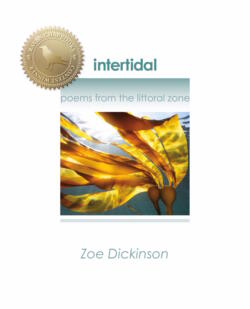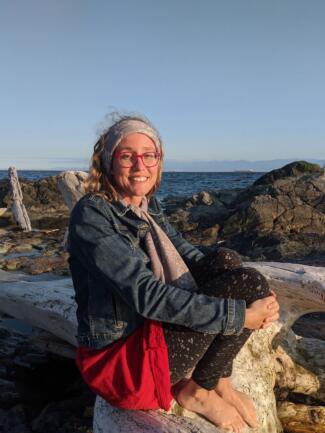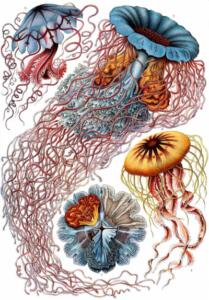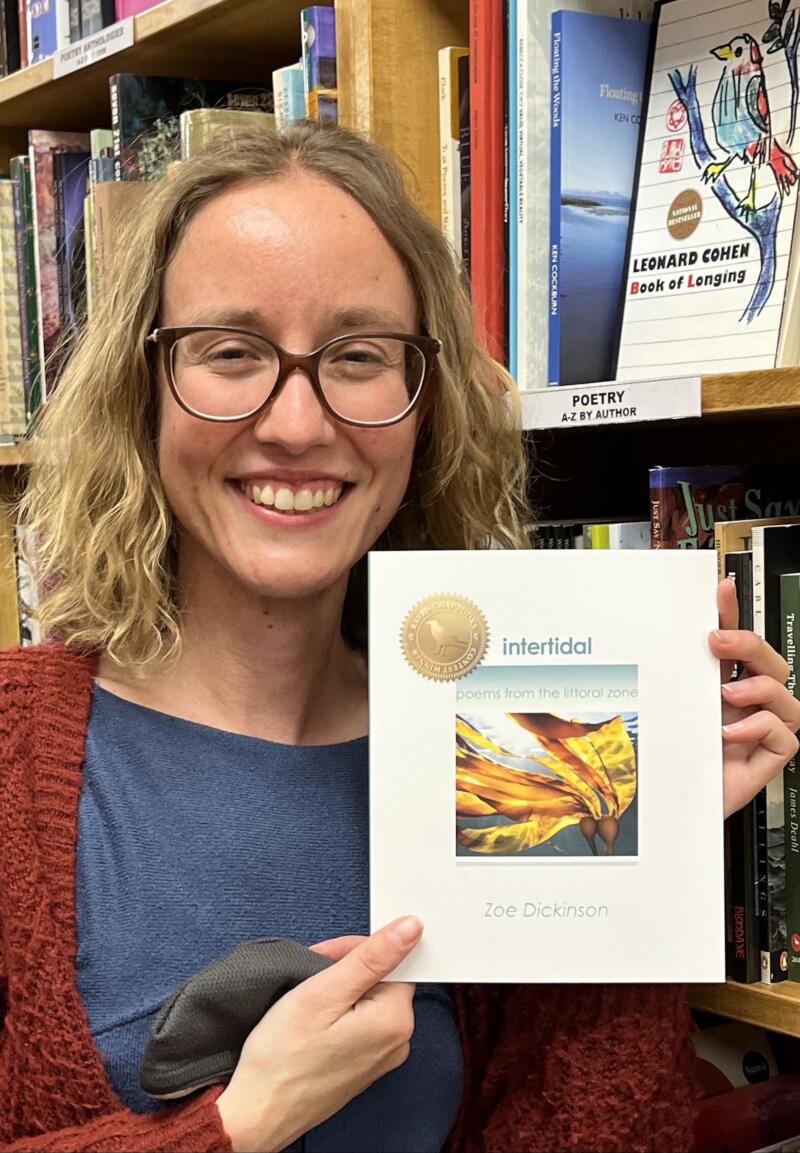1520 To move as the kelp moves
Intertidal: Poems from the Littoral Zone
by Zoe Dickinson
Salt Spring Island: Raven Chapbooks, 2022
$20.00 / 9780973440898
Reviewed by Brian Day
*
![]()
 Zoe Dickinson’s Intertidal, the winner of this year’s Raven Chapbooks Poetry Contest, speaks from the verges of the Juan de Fuca Strait. The voice of these poems patiently and reverently attends to the creatures observed there, presenting them as species of marvel and as beings with wisdom to offer their observer. This is a book that is sedulous in its attention to the local, the specific, and that expands from close observation of the littoral zone to a broad and resonant sense of self. Dickinson’s poetry is on intimate terms with the natural world: receptive to it, both touched and wounded by it.
Zoe Dickinson’s Intertidal, the winner of this year’s Raven Chapbooks Poetry Contest, speaks from the verges of the Juan de Fuca Strait. The voice of these poems patiently and reverently attends to the creatures observed there, presenting them as species of marvel and as beings with wisdom to offer their observer. This is a book that is sedulous in its attention to the local, the specific, and that expands from close observation of the littoral zone to a broad and resonant sense of self. Dickinson’s poetry is on intimate terms with the natural world: receptive to it, both touched and wounded by it.
What Dickinson accomplishes in this short volume demonstrates her mastery of two of the fundamental functions of poetry. For one, she is able to write here now: to express vividly and recognizably the particularities, complexities, nuances of one precise place and time. So often her poetry recreates what occurs in her poem “barn swallow,” where the birds in their flight are:
every moment
here,
here
every wingbeat angled exact
going nowhere but here
and here
and here

Dickinson also accomplishes, with often breathtaking ease, a bridging of the natural and human worlds, gliding from close observation of shoreline creatures to the implications or corollaries in human awareness. This fluidity, this moving across the porous membrane between world and self, is a delight of reading Intertidal. The poet regards, with remarkable sensitivity, invertebrates and molluscs, their shells and absence of shells, and she achieves repeatedly some fusion of the sensitive with the robust or resolute. She says, addressing a nudibranch:
teach me to be soft
and inexorable
A seagull swallowing a gunnel that insists on rising up through its throat gives rise to apt analogies, smoothly achieved and non-avian images:
a word not yet
to be said—
the hand of a swimmer
going under—
And from “anemone advice:”
you can digest anything
if you hold it in your mouth long enough:
snail
crab
apology

Again and again, she strikes lovely notes of lyricism. The mouths of sand lances are “round as rain.” We marvel at orcas and as we listen are repeatedly “stunned/ to stillness.”
Dickinson inhabits the difficult awareness of knowing the effects of humans on starfish and swallows, on the tender and vulnerable life of the sea. The poet muses at once on the magnificence of the littoral creatures and their tenuous persistence due to the lack of care and the climatic violence of humans. The poems move gracefully between praise and lament, never shying from honesty, while addressing the world that the poet cherishes and accompanies in its decline. Her observation is meticulous and at times steeped in the highly specialized vocabulary of marine biology, but the reader is consistently invited toward rather than held at a distance from the beings observed.
The collection begins with “I’d like to start by acknowledging,” a poem that leaps off the expected text of a land acknowledgement and tumbles through reflection on the complexities, ambiguities, and tensions inherent in settler habitation on unceded land. It is a potent, riveting beginning.
The book closes with “laminariales,” a poem that returns to touch on First Nations languages. The poem presents, while carrying all the lamentable results of human behaviour, a hopeful and questioning aspiration to carry up to the surface some bubble of underwater atmosphere, some purity from the oceanic world, to move as the kelp moves, up toward light.
As a physical object, Intertidal has been produced with meticulous care. From the luminous and evocative cover photo and design to the internal illustrations and full-colour plates to the hand-welcoming silkiness of the paper, this is a book that is a pleasure to hold and leaf through.
Intertidal is a book that is difficult to read without envy. On completing my first reading, I was struck by how much this chapbook includes in its rigorous locality, how it provides a reader access to a consciousness receptive to the littoral world, and how it provides in its attention and awareness an aesthetic model of what our relation to our precious and threatened environment might be.
*

Brian Day has published four books of poetry with Guernica Editions, including The Daring of Paradise (2013) and Conjuring Jesus (2009). His poems have appeared in The Malahat Review, FreeFall, Prairie Fire, and various other journals. He won third prize in the 2021 Short Grain Poetry Contest. He lives on Salt Spring Island.
*
The British Columbia Review
Publisher and Editor: Richard Mackie
Formerly The Ormsby Review, The British Columbia Review is an on-line journal service for BC writers and readers. The Advisory Board consists of Jean Barman, Wade Davis, Robin Fisher, Cole Harris, Hugh Johnston, Kathy Mezei, Patricia Roy, Maria Tippett, and Graeme Wynn. Provincial Government Patron (since September 2018): Creative BC. Honorary Patron: Yosef Wosk. Scholarly Patron: SFU Graduate Liberal Studies.
“Only connect.” – E.M. Forster


One comment on “1520 To move as the kelp moves”
Quiet fascinating